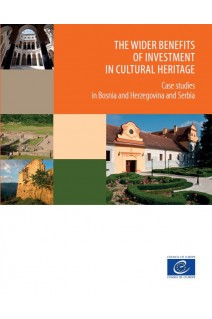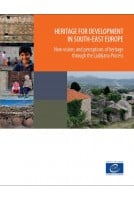



Dozens of investments have been made in cultural monuments and historic environments in the countries of South-East Europe over the last decade in accordance with the principles of the European Union and Council of Europe Ljubljana Process. Whether investing in cultural heritage actually produces dividends for local economies and improves the quality of life of communities has not been previously demonstrated, however. This book reports on a pilot exercise carried out by the Research Unit on South Eastern Europe at the European Institute of the London School of Economics and Political Science. It develops a methodology for the collection of evidence needed to monitor and evaluate the wider benefits of investment in cultural heritage.
This book presents the findings of a study on six completed projects in Bosnia and Herzegovina and Serbia. It identifies the challenges to achieving sustainable development goals – and how they may be met – and the benefits, both direct and indirect, that can arise from developing and valorising cultural heritage sites and increasing their influence on the sustainability of the local economy and on quality of life.
On the basis of detailed case studies, the book provides an overview of the main challenges facing cultural heritage in South-East Europe from a pan-European perspective and analyses the institutional and policy framework for effective sustainable rehabilitation. It concludes with an assessment of lessons learned from the study and makes some suggestions for generating wider benefits from future investment in the cultural heritage of South-East Europe.
Contents
PREFACE
EXECUTIVE SUMMARY
Legal and administrative weaknesses
Severe co‑ordination issues
Awareness
The case studies
Other aspects
1. INTRODUCTION
2. CHALLENGES FACING CULTURAL HERITAGE
Exploring and deepening the understanding of the values of heritage
Financial resources
More inclusive approaches
Promoting access and participation in heritage and its management
Enabling an integrated understanding of heritage
Importance of professional and institutional development
Previous research
3. METHODOLOGY
Policy analyses
Case studies
Visitor and community surveys
4. CULTURAL HERITAGE IN PRACTICE
4.1. Bosnia and Herzegovina
4.2. Serbia
5. CONCLUSIONS AND LESSONS LEARNED
Policy issues
The wider benefits of investment in cultural heritage
Lessons learned
REFERENCES
APPENDIX: THE LJUBLJANA PROCESS
The Ljubljana Process I and II
Télécharger un extrait (1000)





Dozens of investments have been made in cultural monuments and historic environments in the countries of South-East Europe over the last decade in accordance with the principles of the European Union and Council of Europe Ljubljana Process. Whether investing in cultural heritage actually produces dividends for local economies and improves the quality of life of communities has not been previously demonstrated, however. This book reports on a pilot exercise carried out by the Research Unit on South Eastern Europe at the European Institute of the London School of Economics and Political Science. It develops a methodology for the collection of evidence needed to monitor and evaluate the wider benefits of investment in cultural heritage.
This book presents the findings of a study on six completed projects in Bosnia and Herzegovina and Serbia. It identifies the challenges to achieving sustainable development goals – and how they may be met – and the benefits, both direct and indirect, that can arise from developing and valorising cultural heritage sites and increasing their influence on the sustainability of the local economy and on quality of life.
On the basis of detailed case studies, the book provides an overview of the main challenges facing cultural heritage in South-East Europe from a pan-European perspective and analyses the institutional and policy framework for effective sustainable rehabilitation. It concludes with an assessment of lessons learned from the study and makes some suggestions for generating wider benefits from future investment in the cultural heritage of South-East Europe.
Attention, en vertu de nos conditions générales de vente, l'achat des PDF/epub est réservé aux particuliers.
